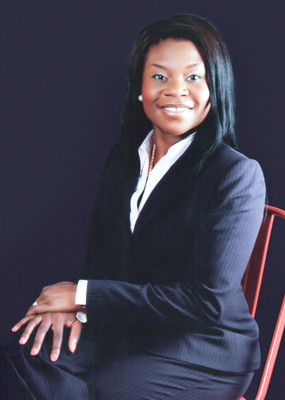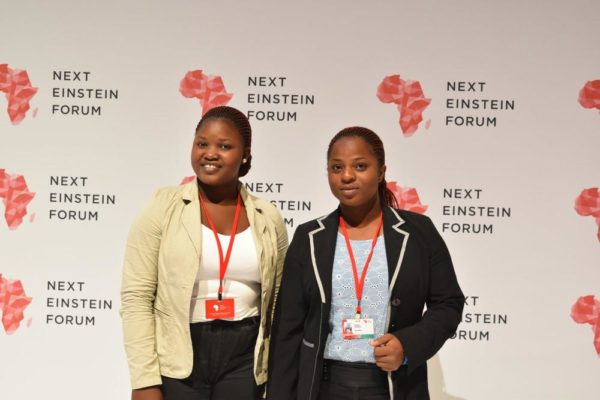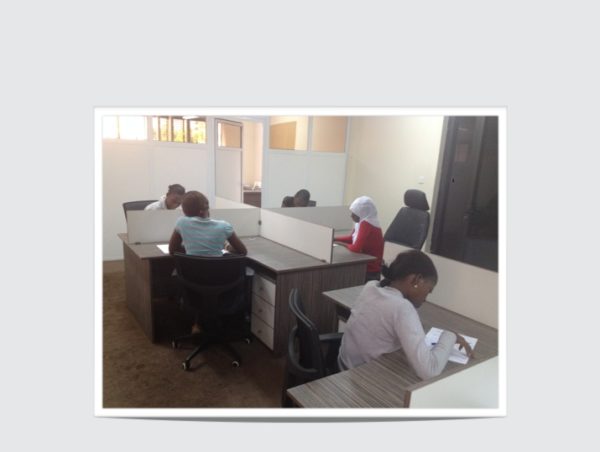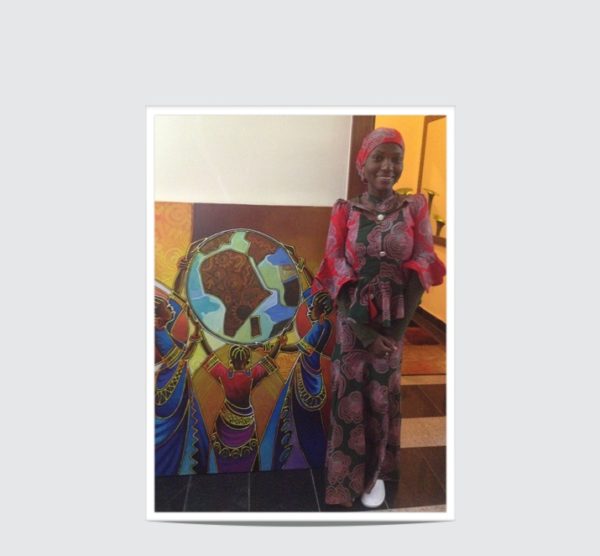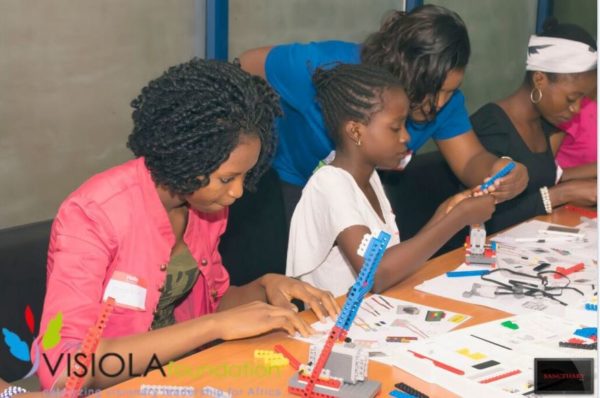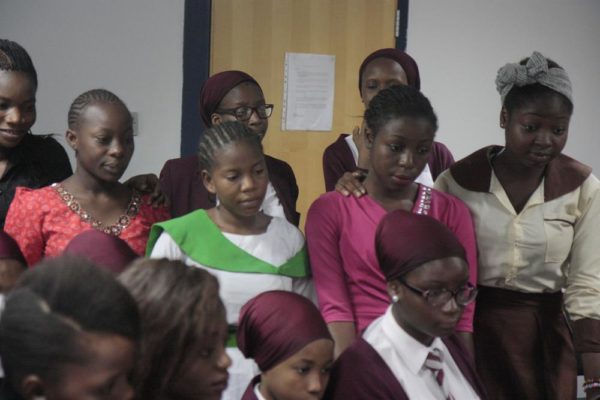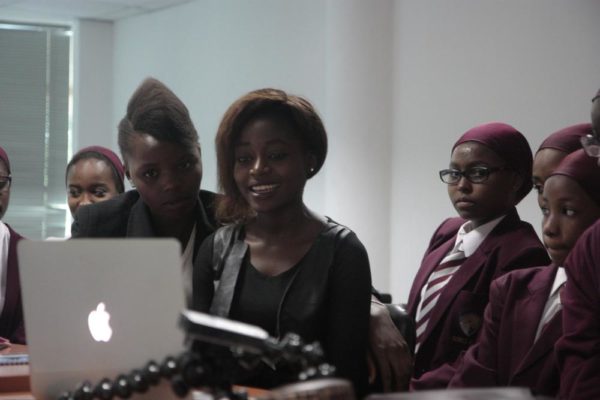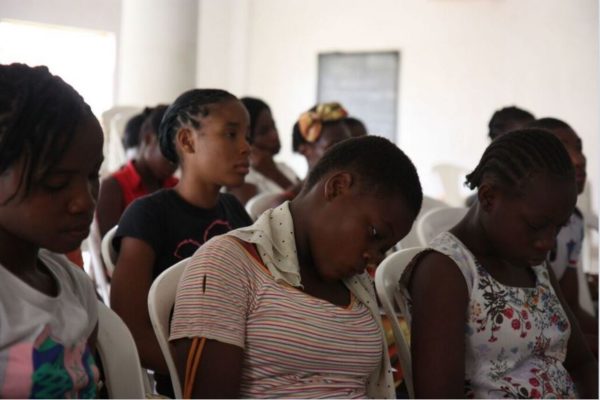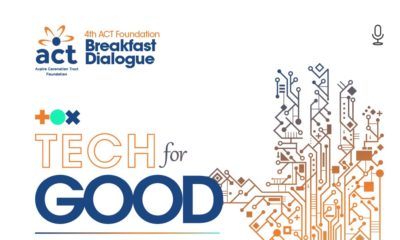Career
In Celebration of International Women’s Day! Here’s a Spotlight on Lade Araba, a Woman Empowering Other Women
Lade A. Araba (36) is the Co-Founder and President of the Visiola Foundation, which is building a pipeline of leading female African scientists, engineers, IT experts, mathematicians, and innovators. Lade is a 2011 Mo Ibrahim Leadership Fellow, a 2014 Archbishop Desmond Tutu Fellow, and a Member of the African Leadership Network (ALN).
She is a global citizen at heart. Apart from English, she is fluent in French and Italian and has basic knowledge of Spanish and intermediate Yoruba. She can understand some Portuguese if spoken slowly. She was born in Lagos and relocated to Rome, Italy with her family when she was 4 years old. Her father was a UN Diplomat. She lived in Italy for 11 years before her parents moved to Ghana and she eventually to the US. Her parents didn’t want her to be totally detached from her roots so she commuted from Rome then Ghana to attend boarding school in Nigeria. As a “third culture kid,” she says she was a frequent flyer on Alitalia and absolutely loved the independence of flying between two continents by herself – she felt responsible from a young age! She graduated from the University of Oklahoma in May 2001 with a double Bachelors degree in Management Information Systems (MIS) and International Business. It was shortly after the IT bubble had burst. She started her career at an IT services company the same year and subsequently returned to school and earned her MBA from Thunderbird School of Global Management in April 2004. She then moved to Washington, DC where she worked for an international development consulting firm (the QED Group LLC). She chose to work in the field of development, driven by her sense of a greater purpose. Soon after, she received an offer from the United Nations Food and Agriculture Organization (FAO) that she couldn’t resist so she returned to Rome in January 2005. And there she had a sort of epiphany.
Having grown up in Rome, she already knew about the large number of African migrants seeking a better life there. But as a child, she didn’t fully grasp the challenges they faced. Now a working adult, she was especially concerned about the young women she met. She won’t go into details about their predicaments, but she was passionate about helping them in whatever way she could. So she started inviting them over to her apartment every month, where they shared a meal and had Bible study, which enabled them to speak frankly about what they were doing in Rome. She used this platform to encourage them to return to their countries, to go to school, and improve their lives. She provided financial assistance to a few. A number of them have since graduated from university and now lead productive lives, and even have their own families. You could say that’s where the vision for the Visiola Foundation was ignited.
The move from Italy to Nigeria
In October 2007 I joined the African Development Bank (AfDB) in Tunisia having gone through the rigorous and highly selective Young Professionals Program recruitment exercise. In early 2009, a few of us were selected for an early, merit-based promotion and I returned to the Infrastructure Finance team as a Senior Investment Officer. I subsequently took a leave-of-absence from the AfDB in January 2012 to serve as Technical Adviser to the Executive Secretary of the United Nations Economic Commission for Africa (UNECA) in Addis Ababa, Ethiopia, having been awarded the prestigious 2011 Mo Ibrahim Leadership Fellowship. My ensuing move to Nigeria in 2013 was to be with my darling husband. I joined the Nigeria Infrastructure Advisory Facility (NIAF) in December 2013 and served as Technical Adviser to the former Minister of Finance.
What theVisiola Foundation does
First of all, “Visiola” stands for “Visionary Leadership for Africa.” The Visiola Foundation’s primary focus is to identify high potential girls and young women from disadvantaged backgrounds, provide them with scholarships to further their education in the science, technology, engineering, and math (STEM) fields, and mentor them to facilitate their personal and professional success. We equip our girls with the moral, technical, and financial tools they require to maximize their potential as future change agents in their respective communities, and indeed in Africa. We currently provide scholarships to girls who wish to pursue STEM degrees at Bayero University Kano and Lead City University. The plight of girls in Northern Nigeria is heart wrenching and we seek to empower as many as we possibly can. In this regard, we are extremely grateful to Patricia S. Bellinger (Executive Director and Adjunct Lecturer at the Center for Public Leadership at the Harvard University Kennedy School of Government (HKS)) and her husband, Richard Balzer, for their generous donation to the Visiola Foundation to enable girls from the north to attend university. We are equally grateful to the EMBA 4 Alumni Group of the Lagos Business School for their generous backing. We also plan to support girls to study at Ashesi University in Ghana and are in early stage discussions with the University of Nigeria at Nsukka. Our support is not limited to scholarships. Our goal is to develop the “whole person” so we ensure that our students have mentors in their fields, are exposed to a variety of STEM professionals, that they acquire the soft skills that are required for their overall success, and that they are coached to become better public speakers. Ours is a total commitment!
Support for girls not yet in tertiary institutions
We also run an annual “STEM Summer Camp for Teenage Girls” and after-school STEM Clubs to get girls interested in the STEM fields from an early age. We are pleased to introduce our new Coding Boot Camp for Girls to expose them to the exciting field of Computer Science and the numerous opportunities it offers. Students with technical skills have an edge over their peers and we seek to create awareness of the diverse career paths that graduates in these fields can take. We want them to know that if they invest in acquiring technical skills, they will never have to beg for a job! This video provides highlights about our summer camps. The Foundation previously ran entrepreneurship-training workshops for at-risk youth in a low-income community in the FCT.
Reasons for choosing to focus on girls and Science, Technology, Engineering, and Mathematics (STEM)
The best way to answer this question is by summarizing some of the important challenges facing Nigeria and other African countries. Allow me to highlight some facts and figures from my opinion editorial piece published by This Is Africa (a publication of the Financial Times). Sixty-two percent of Nigerians are under the age of 24 and 49% of the population is female. However, a wide gender divide still exists in the corridors of leadership, in corporate boardrooms, in classrooms, and especially in the fields of Science, Technology, Engineering, and Mathematics (STEM). Female participation in Physics, Computer Science, and Engineering remains low. In Nigeria, female enrolment in the STEM subjects peaks at an average of 20% according to data from the National Universities Commission (NUC). We have high unemployment rates although there are numerous instances of jobs remaining unfilled simply because employers in industry cannot find graduates with the requisite technical skills. Unfortunately, our gender stereotypes and cultural biases further relegate girls and women to the background and they are often not granted equal access to socio-economic opportunities. This is especially true in marginalized and low-income communities, where girls are primarily valued for their childbearing ability. The problem with this scenario is that we, as a country and as a region, are therefore only using half of our brainpower, creativity, and innovation potential to pursue economic transformation. Since women account for half of our population, ostracizing them means that we are “doing things by half.” That is not a sensible strategy!
Solution to the above problem
Putting this in simple terms, we need millions of STEM professionals to develop solutions to our core challenges, which include infrastructure (electricity, water and sanitation, roads, railways, and Information Technology), health care, education, and so on. STEM teaches its students to think critically, to analyze complex issues and to break them down systematically in order to overcome them effectively. This is why Africa as a whole spends US$ 4 billion each year to hire foreign STEM professionals! We hire foreigners because we cannot find all the talent locally! In fact, according to the American Association for the Advancement of Science (AAAS), more African scientists and engineers work in the USA than in Africa! That is simply absurd! Imagine if African countries used that US$ 4 billion to hire technically competent African youth who reside on the continent! It would have a transformative impact on our economies, and would improve the lives of millions of people, while lowering unemployment. We really need to focus on reducing the striking inequalities that exist in Nigeria to ensure that millions more have access to social services so that they too can fulfill their aspirations. We need to become ambitious for our country and should desire to see the majority of our people having access to robust infrastructure, a good quality education, improved health care, and good jobs. We need to build a real middle class that consists of millions of people who earn a “living wage” and who don’t simply subsist above the equivalent of US$ 2 a day. We should move away from this dependence on the Government for everything! Instead, Nigerians should live in an “enabling environment” where they have access to basic services, can work hard to create their own livelihoods, and where they can achieve an improved standard of living, regardless of who they are and where they were born. This should be our Nigerian Dream for all. It will additionally restore human dignity to those who currently live in deplorable conditions.
If Nigeria and other African countries intend to realize their industrialization aspirations and become globally competitive, they must invest in the technical education of citizens to ensure that the necessary skills are available locally to drive industrial growth. We therefore require concerted efforts to build a pipeline of future innovators with deliberate action taken to engage girls and young women and thereby confront the prevailing gender stereotypes and cultural biases. A person with technical competencies can lend his/her knowledge to various industries, effectively guaranteeing numerous employment options, while providing greater job mobility and flexibility.
Investing in STEM education (especially for women) produces greater prosperity for all – numerous studies have been done about the positive impact (financially speaking) of women in corporate positions, in industry, and in academia. And it is a well-known fact that women who are financially empowered invest in their families and communities. Our strategic focus to empower girls and women through education, training, and mentoring in the STEM fields was therefore a no-brainer!
Criteria for the Selection of Scholarship Recipients
The Foundation undertakes a rigorous selection process, which includes tests and interviews for all short-listed candidates. The scholarship is open to all high potential girls from disadvantaged backgrounds. Candidates simply need to apply through our partner institutions to be considered. We are keen to identify students with academic and leadership potential, who are passionate about solving a problem and transforming our great continent. It is exciting to be able to empower those who are disadvantaged simply because of where they were born and not because they lack the intellectual ability or desire to succeed in life.
The Visiola Foundation’s Impact
Our scholars are excelling in their chosen fields. For instance, two of them (Omolara and Rachael) are currently the best biochemistry students at their university and some potential employers have already taken an interest in them. They recently boarded a plane for the very first time in their lives to participate in the Next Einstein Forum in Dakar, Senegal! There they met H.E. President Macky Sall (Senegal), H.E. President Paul Kagame (Rwanda), the Hon. Minister of Higher Education & Innovation of Senegal, Dr. Mary Teuw Niane, the Hon. Minister of Science & Technology of South Africa, Dr. Naledi Pandor, the Hon. Minister of Science & Technology of Nigeria, Dr. Ogbonnaya Onu, and distinguished scientists and innovators from across the globe. We are certainly making positive strides towards building that pipeline of future leading female African STEM professionals!
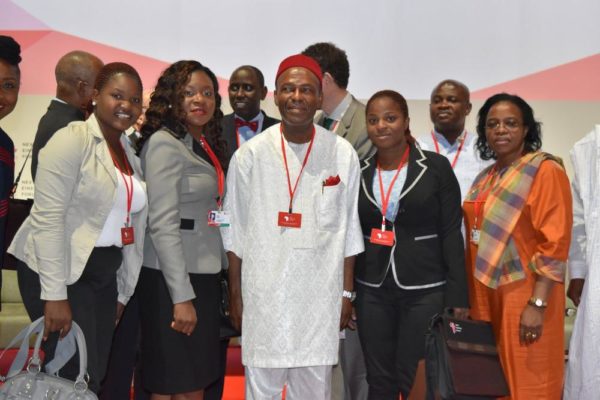
The Hon. Minister of Science & Technology, Dr. Ogbonnaya Onu with the President of the Visiola Foundation and 2014 Science Scholars Rachael and Omolara
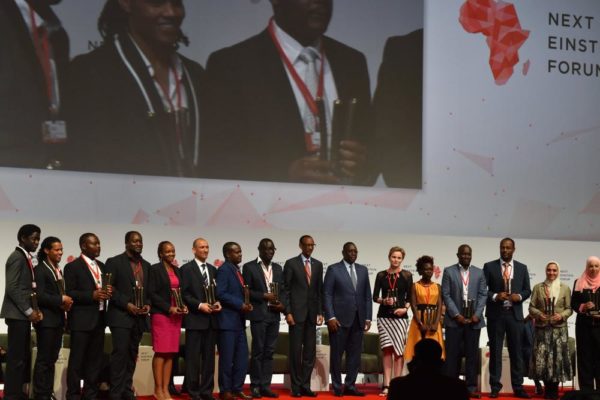
H.E. President Macky Sall (Senegal) and H.E. President Paul Kagame (Rwanda) presenting awards to leading African scientists during the Next Einstein Forum, which took place in Dakar, Senegal on March 8 – 10, 2016
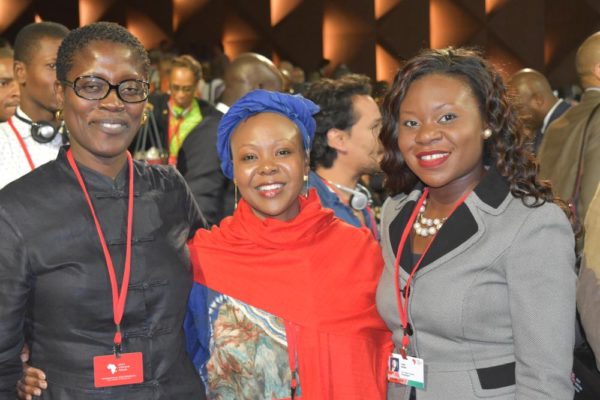
Julie Makani (Wellcome Trust Fellow), Elsie Kanza (Head of Africa, World Economic Forum), and Lade Araba (Co-Founder/President, The Visiola Foundation)
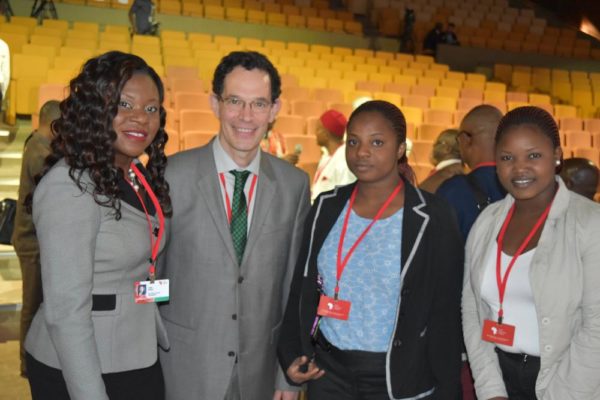
Lade Araba and the scholars with Dr. Neil Turok (Leading South African Physicist and Founder of the African Institute of Mathematical Sciences (AIMS) during NEF2016)
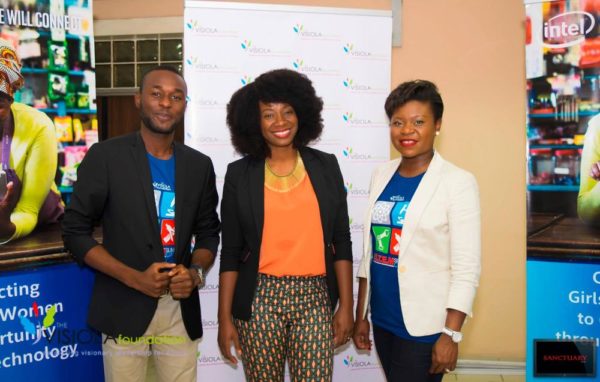
Titilope Sonuga (Civil Engineer, award-winning poet and actress, Ambassador of Intel Corporation Nigeria’s She Will Connect Program), Francis O’Size Director of e2 Young Engineers, and Lade Araba
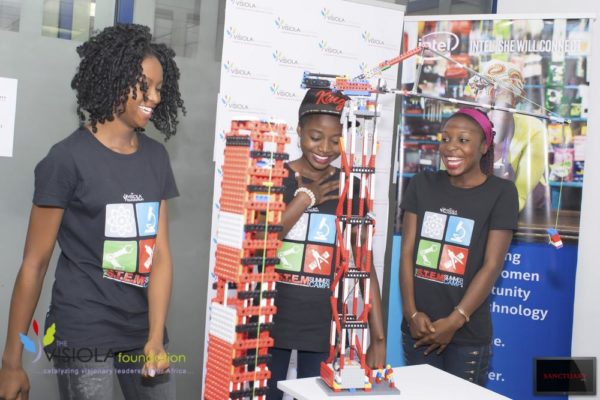
Sophia, Chioma, and Mary (Mechanics Team) presenting their winning project during the closing ceremony of the 2015 STEM Summer Camp for Teenage Girls in Abuja
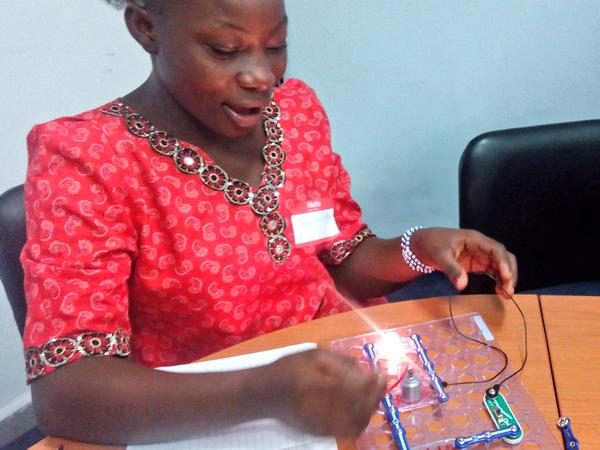
Martha (2015 STEM Summer Camp participant) tried very hard to build an electric circuit and her perseverance paid off! The light bulb (literally) came on!
Connect with the Visiola Foundation on: www.visiolafoundation.org
Twitter: @Visiola_Fdn
Facebook: www.facebook.com/thevisiolafoundation
Instagram: visiola_fdn
Linkedin: www.linkedin.com/company/the-visiola-foundation
_______________________________________________________________________
Sponsored Content

